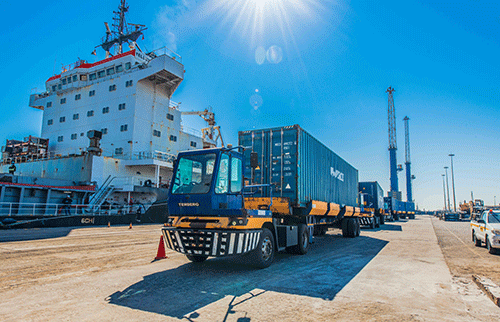SWAKOPMUND – Infrastructure development, innovation and increased competitiveness are pivotal factors that will position Namibia as a key centre for trade and investment from both local and global stakeholders.
This was emphasised by deputy minister of international relations Jenelly Matundu, who highlighted the importance of proactive and strategic measures to fully capitalise on the advantages of the African Continental Free Trade Area (AfCFTA).
She made these remarks during the 19th Theo-Ben Gurirab Lecture Series, held in Swakopmund on Thursday.
The theme of the lecture was ‘How can the AfCFTA benefit the Erongo region to become the preferred gateway to Africa and the world at large’.
The lecture also explored the transformative impact the agreement can have on the region, positioning it as a preferred gateway for trade and investment between Africa and the rest of the world.
Matundu pointed out that the strategic advantage of the Erongo region lies in its access to major ports and transportation networks, making it lucrative to enhance trade opportunities between the landlocked countries of southern Africa and the global markets.
“The AfCFTA’s objectives include establishing a unified market with a collective GDP for the entire continent, eradicating trade obstacles and promoting intra-African trade, as well as value-added production and trade across all service sectors in the African economy. Hence, we aim for Erongo to emerge as the preferred gateway to Africa and the global stage through the Namibia Ports Authority,” she said.
Matundu urged the business community and Namibians at large to explore how the AfCFTA can positively impact the region and elevate it to greater levels of prosperity and prominence.
She then highlighted that the AfCFTA presents a plethora of advantages for Namibia, promising to transform its economic landscape.
“By becoming part of the agreement, Namibia gains access to a market of 1.3 billion people, enabling businesses of all sizes to expand their reach beyond national borders and tap into a larger consumer base, creating new avenues for growth,” Matundu said.
According to her, Namibia has made significant progress in advancing the corridors (Trans-Kalahari, Walvis Bay-Ndola-Lubumbashi and Trans-Cunene) making it one of the selected countries catering to a vast region of prospective consumers – 300 million people – through the Walvis Bay Corridor Group, utilising the Port of Walvis Bay as a key entry and exit point.
“The corridor has gained recognition as a model for efficient trade facilitation, playing a crucial role in the country’s economy by acting as an entry point for domestic, regional and global trade. Furthermore, Namibia’s seaports, including the container terminal at Walvis Bay, have substantially improved the country’s position in regional maritime industries, especially due to increased handling capacity. This additional capacity is expected to attract a larger volume of goods to Namibia and facilitate smoother trade within the region. Overall, this agreement brings promising prospects for Namibia’s economic development, opening doors to a broader market and propelling the nation towards greater prosperity and sustainability,” she said.
– edeklerk@nepc.com.na



